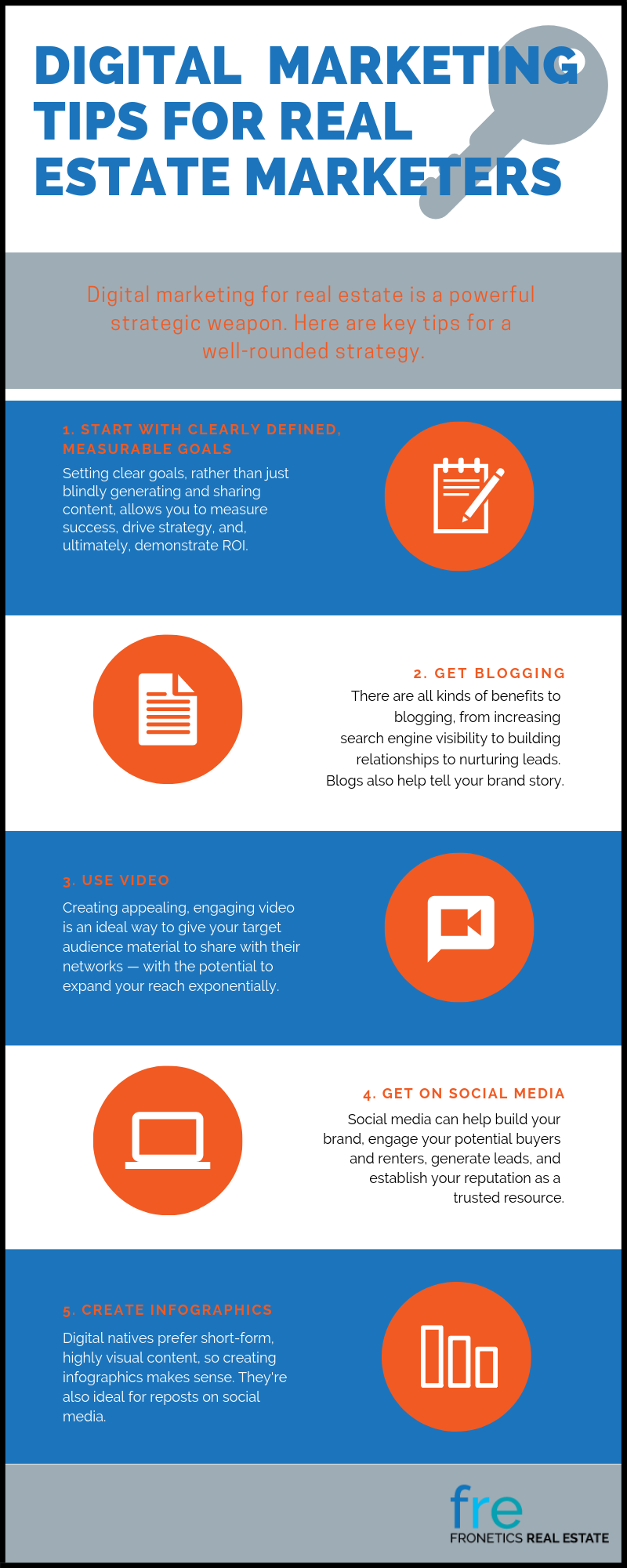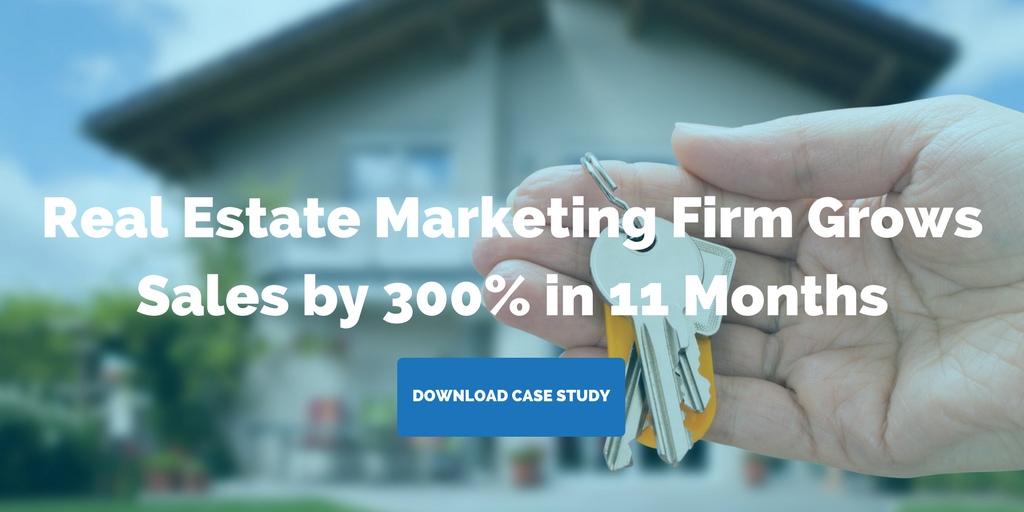Your search results for "Measuring success"

Infographic: 5 Tips to Make Digital Marketing for Real Estate Count
Digital marketing for real estate is a powerful strategic weapon. Our infographic gives you some key tips for a well-rounded strategy.
Highlights:
- 88% of all home buyers use the internet to collect information, and for 43%, an online search is their first step.
- When you kick off digital marketing for real estate, setting clear goals, rather than just blindly generating and sharing content, allows you to measure success, drive strategy, and ultimately, demonstrate ROI.
- Video is an ideal way to give your target audience material to share with their networks — with the potential to expand your reach exponentially.
As the realm of marketing has undergone a seismic shift in the past decade, digital marketing for real estate has taken off. According to the National Association of Realtors, 88% of all home buyers use the internet to collect information, and for 43%, an online search is their first step. Real estate marketers are increasingly targeting their efforts on digital media, and content marketing is one of the best ways to do this.
Our infographic below represents our favorite digital marketing tips for real estate marketers. Read on for ways you can use this powerhouse tool to market your brand and properties.
Digital marketing for real estate — 5 tips
1) Start with clearly defined, measurable goals
Effectively selling or leasing property requires a comprehensive, data-driven approach to marketing — which means starting with clearly defined, measurable goals. Are you looking to generate more leads? Raise brand awareness? Grow your social media presence? When you kick off digital marketing for real estate, setting clear goals, rather than just blindly generating and sharing content, allows you to measure success, drive strategy, and ultimately, demonstrate ROI.
2) Get blogging
Blogs help you sell real estate. Period. There are all kinds of benefits to blogging, from increasing search engine visibility to building relationships to nurturing leads. The more you publish, the higher you’ll rank with search engines. And every time you publish a blog post, you increase the chances that a user searching online for real estate will find your website.
Blogs also help tell your brand story. They help buyers imagine themselves in your space. They nurture leads and build trust among potential buyers. In a recent audit of a client’s website, we found that people who read the blog converted at an almost 30% higher rate than other web traffic. That’s significant.
3) Use video
If you’re a frequent reader of our blog, you’ll know that we’ve been writing about the astronomical rise of video in real estate marketing for a while now. We can’t stress it enough: video is here to stay, and it’s time your business starts embracing it as a highly effective content marketing tool.
Part of what makes video such an appealing form of content is its inherent shareability, which drives organic traffic. Getting your content and properties out to your base audience is one thing but empowering that audience to be your ambassadors is a huge next step. Creating appealing, engaging video is an ideal way to give your target audience material to share with their networks — with the potential to expand your reach exponentially.
4) Get on social media
Real estate is a people business. That’s why you should leverage a marketing tool that is also all about people: social media. If you have not begun developing social media strategies for your real estate business, now is the time to get started.
Consider for a minute that in 2017, 81% of Americans had at least one social media profile. And the numbers are projected to continue skyrocketing: by 2020, 200 million people just in the U.S. are estimated to be on social media. Used wisely, social media can help build your brand, engage your potential buyers and renters, generate leads, and establish your reputation as a trusted resource.
5) Create Infographics
Infographics can be one of the most effective mediums for digital marketing for real estate. We know that digital natives, who make up the majority of real estate buyers today, prefer short-form, highly visual content. So, infographics make a lot of sense when it comes to speaking their language. Infographics are also prime candidates for reposts on social media.
Since the text in infographics isn’t readable by search engines, you can make the most out of your content and bump up your SEO by including a transcript of your text with your graphic, ideally at least 350 words.
Final thoughts
Online searches have changed real estate marketing for good. In fact, the possibilities that digital marketing offers are varied, constantly evolving, and exciting. Savvy real estate marketers are using quality content to raise brand awareness, improve SEO, build relationships, and generate leads.
Related Posts:
- A Visual Guide to Social Media Posting Frequency for Real Estate
- 10 Social Media Statistics for Real Estate Marketers 2018
- 10 Quick Ways to Grow Brand Awareness
Your search results for "Measuring success"

Start Your Property’s Social Media Program in 6 Steps
When launching a property’s social media marketing program, make sure you’ve thought through strategy, content, and audience.
Social media marketing for real estate is a must-do. The reality is that’s where the average American is spending his/her free time — nearly 2 hours a day, according to a recent study. Using platforms like Facebook, Twitter, and YouTube to market your property, you can:
- engage potential buyers
- build brand awareness
- elevate brand position within the market
- decrease cost per lead
- increase occupancy or sales
- improve retention
- and more
Sounds great, right? But where do you start? Which platforms should you use? How will you ever convince your boss that this is a valuable use of your time?
Starting your property’s social media program can seem like an intimidating task, especially if company leadership is skeptical of the benefits. Here are six steps to launching a real estate social media program that will grow your business to its full potential.
6 steps to start your property’s social media program
1) Speak in the right terms.
Convincing management that you want your team to spend more time on social media to gain “followers” or get “shares” could be a hard sell — even though that kind of engagement is key in real estate sales and rentals. To win support, focus your argument around the factors that are most important to them. Lead generation, lead nurturing, conversions, sales, ROI, profits: this should be the vocabulary with which you approach this conversation.
2) Create a strategy — and put someone in charge.
Only 11% of companies without a documented content marketing strategy find their efforts to be successful, compared to 60% of companies with a strategy in place. And that number rises to 86% when the company designates someone to lead the strategy.
Develop a content marketing strategy — inclusive of social media — that aligns with your goals for the property (e.g., more visits to the website, increased occupancy, better retention rates). And whether someone on your team heads up execution or you outsource that responsibility, the leader should continually monitor analytics and tweak the strategy accordingly to ensure the property’s social media program is meeting the designated marks.
Which brings me to…
3) Determine which analytics to track.
In real estate social media, shares, likes, and impressions speak to your brand exposure, so they’re important to track. But it’s important that you’re looking at more than just these surface metrics. (Read more about so-called “vanity metrics” here.) Leads generated, conversion rates, sales, and ROI are going to tell you if your efforts are helping your bottom line. If you have a good, flexible strategy in place, these metrics will help you adjust your efforts to ensure you’re achieving your business objectives.
4) Develop quality content.
Twenty-seven million pieces of content are shared every day — and a large portion of it is crap. A social media presence could be pretty pointless unless you’re not using it in a way that your followers find valuable. Good, quality content is the alpha and the omega, the key to engaging your followers.
One of the biggest mistakes real estate marketers make is using social channels to push a blatant sales pitch. You’ll quickly lose your audience that way. Your property’s social media should be about engaging target buyers or tenants, building brand awareness, and offering valuable and interesting information.
5) Decide which channels are right for your business.
Who are you trying to reach, and what are you trying to tell them? These are good questions to ask when trying to determine which platforms will comprise your social media program. You need to know who your target buyer/tenant is, and you need to know what kind of information you’re going to offer them.
There’s a wealth of data out there about who uses which channels and when. Most social media platforms also have their own built-in analytics tools that can help you determine the best time for engagement with your followers.
Another thing to consider: You’ll want to choose channels that you’ll be able to maintain regularly and which play to your strengths. If you don’t have the time, skill, or interest in taking regular photographs of things around your property, for example, Instagram probably isn’t for you. Remember, you’ll likely want to work through several different channels to reach a maximum number of potential customers.
6) Follow your competitors.
Following your competitors is a great way to stay up to date on what they’re doing, especially if you don’t have a ton of time or money for competitive research. And when I say “follow,” I don’t mean “copy or imitate.” I mean subscribe to their blogs, engage with them on social media, and like and share their content that you find meaningful for your audience. This way, you become part of the local conversation happening online, and you know exactly what your potential buyers and tenants are seeing from (and how they’re reacting to) your competitors.
Related posts:
- The Metrics You Should Be Measuring in Real Estate Marketing
- 6 Marketing Tasks Real Estate Marketers Can Outsource
- Social Media Can Be a Strategic Weapon in Real Estate Marketing
Your search results for "Measuring success"

Write it Down: Why You Need a Digital Marketing Strategy
Having a documented digital marketing strategy increases brand awareness and provides a starting point for in-depth analytics.
Highlights:
- A digital marketing strategy should be clearly documented, enabling you to fine-tune and adjust sections — or the entire document — in response to analytics.
- From social media channels to blogs, enhanced customer engagement enables real estate brands to open a two-way communication with potential buyers (and renters).
- A clearly articulated digital marketing strategy is the foundation of generating qualified real estate leads.
Digital marketing for real estate has become mandatory in recent years. With over 3.2 billion users globally, the internet has opened up countless opportunities for brands to connect with new and growing audiences — and the real estate industry has benefited in a major way. According to recent market surveys, 92% of potential buyers do vigorous research online before making a home purchase.
With luxury development projects on the rise in the Boston area as well as other metros across the country, a digital marketing strategy can give developers a competitive edge. Note: The strategy should be clearly documented, enabling you to fine-tune and adjust sections — or the entire document — in response to analytics.
Benefits of a documented digital marketing strategy
Brand building
To succeed in the highly competitive and dynamic real estate industry, you need a strong and reputable online presence. Using tools like workflows, search engine optimization, and social media, real estate marketers can grow brand awareness. Digital marketing allows you to attract potential buyers from a global market. From social media channels to blogs, enhanced customer engagement enables real estate brands to open a two-way communication with potential buyers (and renters).
Higher conversion rate
Digital marketing fosters a higher conversion rate of people who visit websites or social media platforms. Why? A well-designed digital marketing strategy nurtures leads and gives them reasons to return to your platforms where pointed calls-to-action and landing pages can capture their information. Establishing your online presence will help you showcase your luxury projects, allowing home buyers to explore purchasing options. Developers with updated and informed content increase their chances of engaging potential customers who are property hunting online.
Increased exposure
It’s no secret that digital marketing helps expand organic reach and increases exposure to new audiences. Geolocation marketing takes it a step further, letting marketers customize content for specific target audiences based on their physical location. Paid advertising on Facebook and Google, for instance, includes this feature. Put to practice, it means your ads target people in certain regions (geo-targeting is based on the visitor’s IP address) or when they enter certain areas that can be as narrow as a neighborhood or a few streets (geo-fencing uses a device’s GPS location).
Lower acquisition costs
Digital marketing offers real estate marketers cost–effective options compared to traditional marketing methods. For example, in a matchup of cost per lead, digital marketing comes out on top.
Performance analysis
Digital marketing offers several analytics tools, such as Google Analytics, that help you track your marketing performance. Tracking your performance online will allow you to understand the nature of the market and the specific techniques that work for your audience. By monitoring keywords, search trends, and search volume, you can determine which keywords to use when optimizing your website.
A clearly articulated digital marketing strategy is the foundation of generating qualified real estate leads. Write it down. Refer to it. Let analytics drive change. That’s how you stand out from the competition.
Related posts:
- DIY Digital Marketing Strategy for Real Estate in Four Easy Steps
- Real Estate Marketing Strategy 2019: Retargeting
- The Metrics You Should Be Measuring in Real Estate Marketing (Hint: Not Vanity Metrics)
Your search results for "Measuring success"

3 Social Media Mistakes Real Estate Companies Still Make
Social media is a valuable tool for real estate businesses, but only if they use it to their best advantage and avoid these three common mistakes.
Highlights:
- By 2019, there will be an estimated 2.77 billion social media users around the globe.
- It’s imperative for real estate businesses to have a clear strategy that includes types of content, frequency, and pillar topics.
- Real estate companies need to focus on creating content that leaves their users wanting more.
As many as 81% of small and medium businesses use a social platform. And we all understand why. By 2019, there will be an estimated 2.77 billion social media users around the globe. That’s a lot of potential customers.
So, there’s no question as to why real estate companies are jumping on the social media bandwagon. And there’s no disputing social media is an effective way to increase brand awareness and generate leads. But it can be fairly useless if your company isn’t doing it right.
Top three social media mistakes real estate companies still make
Mistake #1: Using objectives instead of strategy
Social media platforms are continually making changes and updates to improve the user experience. In order to weather these changes and keep your audience engaged, it’s imperative to have a clear strategy that includes types of content, frequency, and pillar topics. Posts should reflect your real estate brand, so make sure posts follow style guidelines and reflect your specific tone.
A strategy will also help prove ROI. Social Media Examiner’s 2018 Social Media Marketing Industry Report found that only 44% of marketers agree that they know how to measure social media ROI. That means two-thirds of marketers don’t know whether or how much their marketing efforts are paying off when it comes to the use of social media. A strategy that incorporates defined goals, tracking and measuring will help prove data-driven ROI and improve your social media presence.
Mistake #2: Using the most popular social media platforms
Not all social media platforms are created equal. In fact, all social media channels have different qualities that make them appeal to specific audiences. Start by identifying which platform your target audience is the most likely to seek out. For example, 81% of millennials view their Twitter account on a daily basis. If your company is looking to capture millennials as leads, your social media efforts should certainly include Twitter.
Once you’ve determined where you should be posting, concentrate on creating content that caters to those specific platforms. Lots of companies post the same content across all of the apps they use. We understand how easy that is for marketers, especially with automation tools. But the foundation of social engagement is authenticity, something that is hard to achieve when posts are the same across all channels. Work to create content — including video and images of properties — that caters to specific platforms to build brand awareness and loyalty.
Mistake #3: Promoting instead of connecting
Social media is all about engagement. Users don’t want to engage with brands that are pushing their properties. Users want informative, interesting, and yes, even fun content. Real estate companies need to focus on creating content that leaves their users wanting more.
Companies that are succeeding on social media are finding innovative and creative ways to relate to users. When you engage and get users involved in your story, you create long-lasting customer relationships. Storytelling creates an emotional bond with your company and drives brand loyalty.
Greg Hadden, executive creative director of Motive Made Studios, sums up the power of connecting with users: “What often gets lost is the fact that good storytelling is potent stuff. It has the power to make people want to believe and to belong, which is the goal of all storytellers. We’re all selling something, be it an idea, an exploration of the human condition, or say, a vacuum cleaner. It’s no mistake perhaps that good stories often create products.”
Final thoughts
Social media platforms are a powerful resource that can help your real estate business grow. But they have to be used correctly. Creating a documented strategy will help shape your brand’s social media presence and give you milestones to test and tweak your progress. Need help creating a social media strategy? Let us help.
Related posts:
- Infographic: Real Estate Social Media Marketing Strategies
- Social Media Can Be a Strategic Weapon in Real Estate Marketing
- A Visual Guide to Social Media Posting Frequency for Real Estate
Your search results for "Measuring success"

Top 5 Blogs for Real Estate Marketers
Blogs are an ideal source of knowledge and insights for real estate marketing professionals. Here are our favorite five blogs for real estate marketers to follow.
Highlights:
- Up-to-date knowledge is crucial for real estate marketers.
- Following the right blogs sets you up for success and keeps you aware of conversations in the industry.
- These five blogs for real estate marketers are our favorite sources of knowledge and insights.
Promoting your properties, growing your business, converting leads — it’s all about having the knowledge-base that shapes your strategies and solutions. There’s always something new to learn in real estate marketing. We think this makes it an incredibly exciting field — but we also know that it can be equally overwhelming.
If you know where to look, there’s a vibrant conversation going on among real estate marketers as an ever-growing field of ideas is being generated and discussed. We’ve compiled this list of our five favorite blogs for real estate marketers that we think you should be following, too. These are ideal places for information and ideas about overall best practices, social media use, writing effective content, and more.
5 blogs for real estate marketers
1. Propmodo Real Estate
Propmodo Real Estate is the place for cutting-edge insights into how technology is changing the way commercial real estate is acquired, managed, and used. This multimedia site follows people, practices, and tools that are shaping the business of real estate.
A few of our favorite posts include a discussion of the commercial real estate sector’s embrace of lease automation, and “Viral Marketing and Buzz Marketing: What is Better for Real Estate Business?”
2. BombBomb
Like Propmodo, BombBomb’s blog is real estate-specific and dedicated to building relationships through video to create more opportunities in email, text, and social media. It’s particularly strong on email marketing, which is still the most profitable form of marketing online.
We love what BombBomb has to say about the nuts and bolts aspects of real estate marketing, but they also have some great think pieces. For example, a recent post and podcast episode on “Trust, Neuroscience, and the Customer Experience” explored the neuroscience behind trusting relationships with clients, the nature of trust itself, and how to cultivate it.
3. HubSpot Marketing
HubSpot Marketing is a phenomenal resource for all content marketers, including real estate marketers. It covers everything you need to know to become a marketing whiz. Topics include SEO, blogging, social media, lead generation, email marketing, lead management, analytics, and more.
These experts in content marketing may not be writing specifically about real estate, but we have them on the list, since it’s worthwhile for real estate marketers to be aware of the larger ideas and solutions being discussed as it pertains to content marketing.
4. Geek Estate
A good choice for the tech-savvy marketer, Geek Estate focuses on what’s happening in real estate technology — for example, the changes happening with Zillow and Trulia. This is a great resource for being on the cutting-edge of upcoming trends.
Geek Estate is a private community of real estate technologists, innovators, and founders. Much of their content requires a subscription, and membership could be well worth your while. The blog has recently tackled the subject of “Uberizing Real Estate with Zillow Offers.”
5. Social Media Today
Like Hubspot, Social Media Today isn’t specifically focused on real estate. However, it’s a great go-to resource for all things social media, a crucial topic for real estate marketers. The blog frequently features insights from leaders in the field. And SMT’s team of influencers covers topics including social media developments, trending, social marketing, digital strategy, and content marketing.
SMT is a particularly good source of up-to-the-minute news from the social media and larger tech sector. The site keeps closely abreast of the latest developments, and keeps a roundup of social media updates separately archived for easy perusal.
Read them all or pick your favorite — you’ll benefit from increasing your knowledge.
Related Posts:




